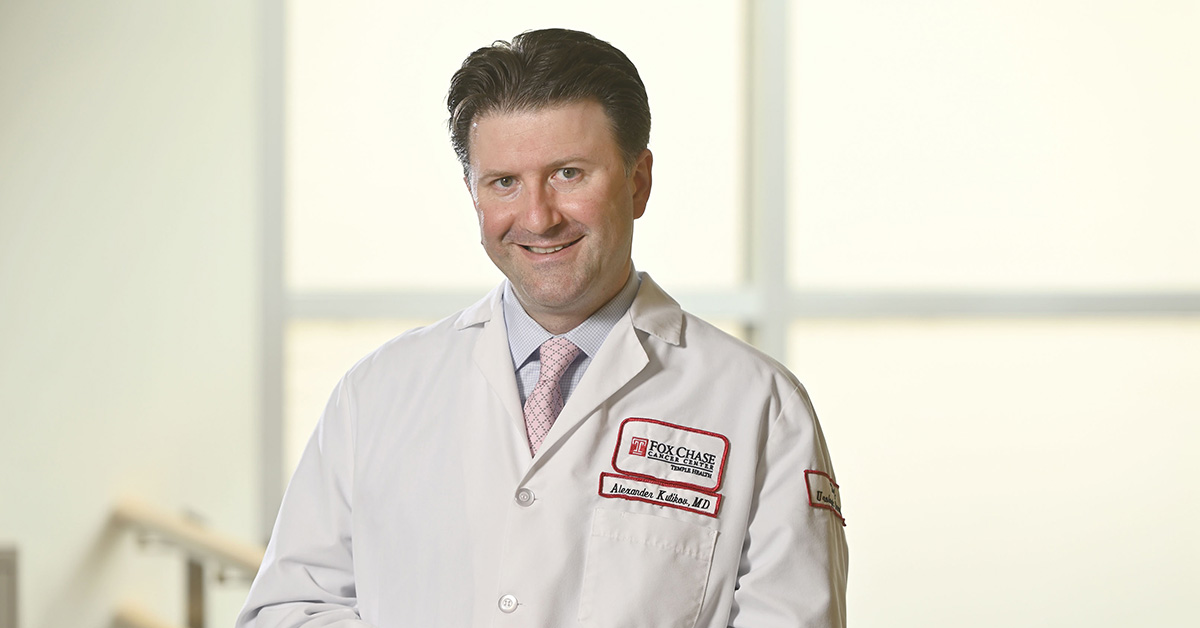
PHILADELPHIA (May 31, 2023)—Cystic renal masses are a common type of kidney lesion that are generally considered to be low-risk and unlikely to spread beyond the kidney. Now a new study from Fox Chase Cancer Center that was featured on the cover of the Journal of Urology, published by Wolters Kluwer sheds more light on these lesions.
It found that as many as 23% of these masses may carry high grade, or aggressive, disease. However, the study also underscores that watching and waiting can be an extremely safe approach for treating patients with these lesions.
The number of people being diagnosed with kidney cancer is rising, and yet mortality rates have stayed relatively the same. This is likely due to a “treatment disconnect,” in which lesions are being diagnosed and treated even when they don’t pose a threat to the patient. That means providers need more information on how to identify lesions that may pose a higher risk, said Alexander Kutikov, MD, FACS, Chair of the Department of Urology at Fox Chase and senior author on the study.
“As clinicians, we need to be aware that some of these cystic masses can harbor more aggressive pathology. But clearly, if we are careful and select the right patients, it’s very safe to watch them,” said Kutikov. He co-authored the article with a number of other Fox Chase physicians, including a new Fox Chase-Temple Urologic Institute hire, Randall Lee, MD, who trained at Temple and Fox Chase and is returning to join the team in September 2023.
The paper’s title is “Pathological and Clinical Outcomes in a Large Surveillance and Intervention Cohort of Radiographically Cystic Renal Masses.”
Previous assumptions about the risk posed by cystic renal masses was based on studies that only used data from lesions after they were removed and tested by pathologists. But these older studies largely ignored lesions that were cystic on imaging but proved to be solid instead of cystic upon resection.
For the new study, one of the largest reported to date, researchers used Fox Chase’s large database of kidney lesions, which indexes near 5,000 cases of kidney mass. Of these, 387 had been radiographically diagnosed as cystic masses. While not all were removed surgically, of the ones that were, 23% were diagnosed as high risk.
Importantly, however, all patients had good outcomes, and there was no difference in terms of survival between patients who underwent surgery and those who followed a watch-and-wait strategy called “active surveillance.” There was also no difference in recurrence between patients who had surgery right away and those who waited.
Kutikov said the results were a surprise.
“We didn’t expect to have this many aggressive tumors in there,” he said. “It recharges the conversation about how we should describe, catalogue, and manage these masses.”
But rather than giving providers “carte blanche” to operate on lesions that might be malignant, he said the study shows that more research is needed. “It’s a call to action to really understand these masses better.”
He noted that current radiological methods cannot visually identify any features on the masses that could predict which ones would be more aggressive, but added that additional studies are planned.
“Especially with artificial intelligence entering the radiology arena, there’s clearly an opportunity here to tease out some variables that may not be evident on human review that could allow us to better risk stratify these lesions,” he said.